 W
WThe Child Ballads are 305 traditional ballads from England and Scotland, and their American variants, anthologized by Francis James Child during the second half of the 19th century. Their lyrics and Child's studies of them were published as The English and Scottish Popular Ballads. The tunes of most of the ballads were collected and published by Bertrand Harris Bronson in and around the 1960s.
 W
W"Angels from the Realms of Glory" is a Christmas carol written by Scottish poet James Montgomery. It was first printed in the Sheffield Iris on Christmas Eve 1816, though it only began to be sung in churches after its 1825 reprinting in the Montgomery collection The Christian Psalmist and in the Religious Tract Society's The Christmas Box or New Year's Gift.
 W
W"Auld Lang Syne" is a popular song and poem, particularly in the English-speaking world. It is traditionally used to bid farewell to the old year at the stroke of midnight on New Year's Eve. By extension, it is also sung at funerals, graduations, and as a farewell or ending to other occasions; for instance many branches of the Scouting movement use it to close jamborees and other functions.
 W
W"The Bonnie Banks o' Loch Lomond", or "Loch Lomond" for short, is a Scottish song. The song prominently features Loch Lomond, the largest Scottish loch, located between the council areas of West Dunbartonshire, Stirling and Argyll and Bute. In Scots, "bonnie" means "attractive", "beloved", or "dear".
 W
WBonnie Dundee is the title of a poem and a song written by Walter Scott in 1825 in honour of John Graham, 7th Laird of Claverhouse, who was created 1st Viscount Dundee in November 1688, then in 1689 led a Jacobite rising in which he died, becoming a Jacobite hero.
 W
WBorder ballads are a group of songs in the long tradition of balladry collected from the Anglo-Scottish border. Like all traditional ballads, they were traditionally sung unaccompanied. There may be a repeating motif, but there is no "chorus" as in most popular songs. The supernatural is a common theme in border ballads, as are recountings of raids and battles.
 W
W"Broom of the Cowdenknowes", also known as "Bonny May", is a traditional Scottish love ballad,. It has been traced to the seventeenth century, but its exact origin is unknown.
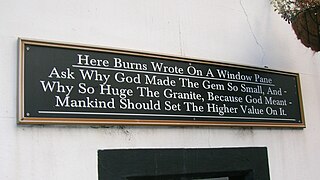 W
WRobert Burns came to know James Cunninghamme, Earl of Glencairn in Edinburgh in 1786 through a 'Letter of Introduction' provided by Dalrymple of Orangefield who was married to Lady Glencairn's sister. The Earl received the poet warmly in his house and introduced him to his friends. One of several gifts from the earl to the poet was a diamond point pen, stylus, or cutter which he used to write upon many windowpanes and glasses, scribing verse, his signature, epigrams, or other writings for posterity. Many of these diamond-point engravings survive, some however are contentious as regards either their authenticity, meaning, or both.
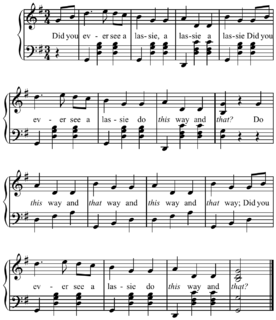 W
W"Did You Ever See a Lassie?" is a folk song, nursery rhyme, and singing game. It has a Roud Folk Song Index number of 5040.
 W
W"The Dowie Dens o Yarrow", also known as "The Braes of Yarrow" or simply "Yarrow", is a Scottish border ballad. It has many variants and it has been printed as a broadside, as well as published in song collections. It is considered to be a folk standard, and many different singers have performed and recorded it.
 W
WGet Up and Bar the Door is a medieval Scots ballad about a battle of wills between a husband and wife. It is Child ballad 275. According to Child, it was first published by David Herd.
 W
W"The Great Silkie of Sule Skerry" or "The Grey Selkie of Sule Skerry" is a traditional folk song from Shetland and Orkney. A woman has her child taken away by its father, the great selkie of Sule Skerry which can transform from a seal into a human. The woman is fated to marry a gunner who will harpoon the selkie and their son.
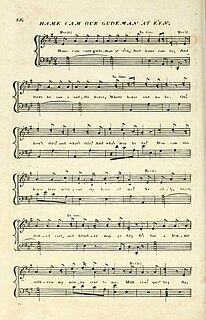 W
W"Our Goodman" is a Scottish and English humorous folk song. It describes the efforts of an unfaithful wife to explain away the evidence of her infidelity. A version of the song, "Seven Drunken Nights", was a hit record for The Dubliners in the 1960s.
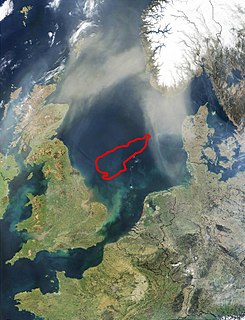 W
WDogger Bank is a large sandbank in a shallow area of the North Sea about 100 kilometres (62 mi) off the east coast of England.
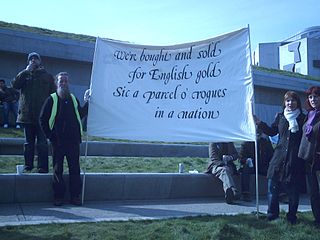 W
W"Such a Parcel of Rogues in a Nation" is a Scottish folk song whose lyrics are taken from a poem written by Robert Burns in 1791, listed as number 5516 in the Roud Folk Song Index. It has continued to be associated with Scottish nationalism and also been referenced in other situations where politicians' actions have gone against popular opinion.
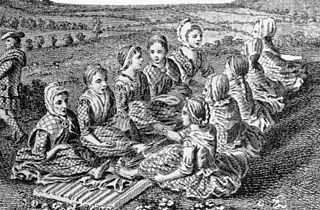 W
WWaulking songs are Scottish folk songs, traditionally sung in the Gaelic language by women while fulling (waulking) cloth. This practice involved a group of women rhythmically beating newly woven tweed or tartan cloth against a table or similar surface to lightly felt it and shrink it to better repel water. Simple, beat-driven songs were used to accompany the work.
 W
W"Wee Willie Winkie" is a Scottish nursery rhyme whose titular figure has become popular as a personification of sleep. The poem was written by William Miller and titled "Willie Winkie", first published in Whistle-binkie: Stories for the Fireside in 1841. It has a Roud Folk Song Index number of 13711.